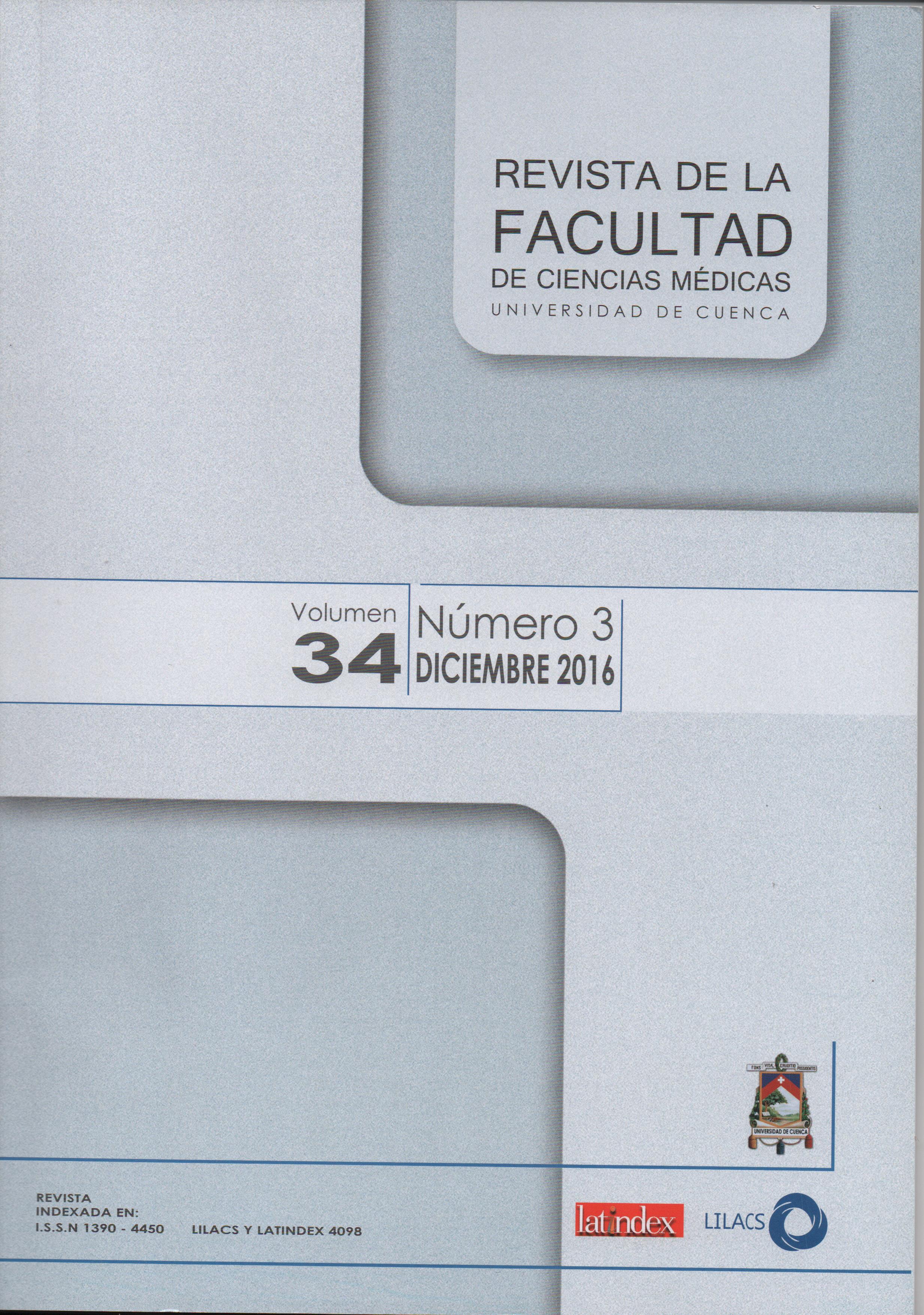SITUACIÓN DE SALUD DE LOS MÉDICOS ESPECIALISTAS GRADUADOS EN LA UNIVERSIDAD DE CUENCA, AÑOS 2004 - 2013
Resumen
RESUMEN
OBJETIVO: Describir la situación de salud de los egresados y especialistas médicos graduados en la Facultad de Ciencias Médicas de la Universidad de Cuenca durante los años 2004 a 2013 y su relación con las condiciones laborales.
METODOLOGÍA: Se realizó un estudio de corte transversal mediante un formulario validado autoadministrado por 102 médicos especialistas, luego del consentimiento informado; también se realizaron entrevistas a informantes claves y revisión de fuentes documentales. El análisis estadístico descriptivo se efectuó mediante frecuencias y porcentajes, y para el cálculo de la probabilidad de asociación entre la autopercepción de la salud con las condiciones laborales, se utilizó la Regresión Logística multivariable, a través del programa SPSS v-20.
RESULTADOS: La situación de salud de los especialistas médicos se caracterizó por una autopercepción de la salud entre más que regular y mal en el 22%, riesgo de sufrir algún problema de salud mental (13%), muy poca actividad física (33%), práctica de deporte menos de una vez por semana o no lo hacen (64%), alimentación inadecuada (47%), presencia de dolor (72%), enfermedades provocadas o agravadas por el trabajo (25%), accidentes laborales (7%), consumo de analgésicos (40%). La autopercepción buena y muy buena de la salud están asociados de manera estadísticamente significativa con el apoyo económico familiar (OR 3.20; IC 95% 1.18 – 8.70), vivir con familiares (OR 4.58; IC 95% 1.49 – 13.99), y decisión sobre cuándo descansar (OR 5.37; IC 95% 2.19 – 13.17). El riesgo de salud mental se asocia de manera significativa con la preocupación sobre los cambios en el salario (OR 5.12; IC 95% 1.46 – 17.93).
CONCLUSIONES: La autopercepción de buena salud depende del apoyo familiar y del descanso, y el riesgo de la salud mental está asociado con los cambios en los salarios.
PALABRAS CLAVE: Salud laboral, salud mental, factores socioeconómicos, factores de riesgo, Cuerpo Médico de Hospitales. Universidad de Cuenca.
ABSTRACT
OBJECTIVE: To describe the health situation of graduates and medical specialists who graduated in the Faculty of Medical Sciences of the University of Cuenca during the years 2004 to 2013 and their relationship with working conditions.
METHODS: A cross-sectional study was carried out using a validated self-administered form by 102 medical specialists after informed consent; also conducted interviews with key informants and review of documentary sources were done. The descriptive statistical analysis was performed using frequencies and percentages, and for the calculation of the probability of association between self-perception of health and working conditions, the Multivariable Logistic Regression was used through the SPSS v-20 program.
RESULTS: The health status of medical specialists was characterized by a self-perception of the health between regular and bad in 22% with risk to suffer any health mental problem (13%), very little physical activity (33%) people who practice any sport less than one time per week or nothing (64%), inadequate food (47%), presence of pain (72%), diseases provoked or aggravated by work (25%), occupational accidents (7%), consumption of analgesics (40%). A good and very good self-perception of health are associated in a statistically significant way with family economic support (OR 3.20, 95% CI 1.18 - 8.70), live with relatives (OR 4.58, 95% CI 1.49 - 13.99), and decision on when to rest (OR 5.37; 95% CI 2.19 to 13.17). The health mental risk is significantly associated with changes in wages (OR 5.12, 95% CI 1.46 - 17.93).
CONCLUSIONS: The self-perception of good health depends on family support and rest, and the health mental risk is associated with changes in wages.
KEYWORDS: Occupational Health, Mental Health, Socioeconomic Factors, Risk Factors. Medical Staff, Hospital. Universidad de Cuenca.Descargas
Descargas
Publicado
Número
Sección
Licencia
Copyright © Autors

Usted es libre de:
 |
Compartir — compartir y redistribuir el material publicado en cualquier medio o formato. |
 |
Adaptar — combinar, transformar y construir sobre el material para cualquier propósito, incluso comercialmente. |
Bajo las siguientes condiciones:
 |
Atribución — Debe otorgar el crédito correspondiente, proporcionar un enlace a la licencia e indicar si se realizaron cambios. Puede hacerlo de cualquier manera razonable, pero de ninguna manera que sugiera que el licenciador lo respalda a usted o a su uso. |
| No comercial — No puede utilizar el material con fines comerciales. | |
| Compartir Igual— si remezcla, transforma o desarrolla el material, debe distribuir sus contribuciones bajo la misma licencia que el original. |
| Sin restricciones adicionales: no puede aplicar términos legales o medidas tecnológicas que restrinjan legalmente a otros a hacer cualquier cosa que permita la licencia. |






